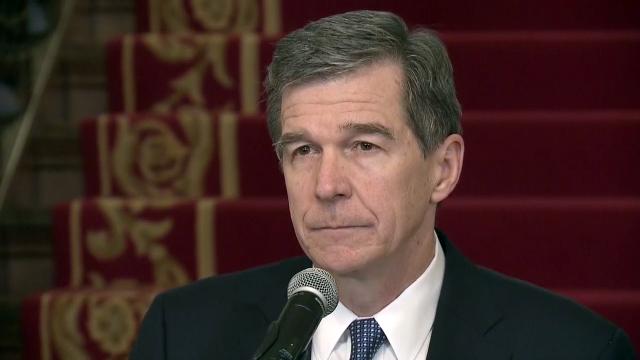 I have recently made a few posts regarding the legality of North Carolina Governor Roy Cooper’s executive orders in response to the COVID-19 “crisis”.
I have recently made a few posts regarding the legality of North Carolina Governor Roy Cooper’s executive orders in response to the COVID-19 “crisis”.
First, I wondered if Cooper had the “concurrence of the Council of State” required by NCGS 166A-19.30(b). I then shared that I had discovered that he did not in fact have concurrence. He had presented his orders to the Council of State, and the Council did not support them.
So, Cooper went ahead anyway. claiming authority under NCGS 166A-19.30(c), a different section of the North Carolina Emergency Management Act. A phone call from an attorney elsewhere in NC alerted me to this fact. Let’s see what the statutes have to say there.
NCGS 166A-19.30(c)
(c) In addition to any other powers conferred upon the Governor by law, during a gubernatorially or legislatively declared state of emergency, if the Governor determines that local control of the emergency is insufficient to assure adequate protection for lives and property because (i) needed control cannot be imposed locally because local authorities responsible for preservation of the public peace have not enacted appropriate ordinances or issued appropriate declarations as authorized by G.S. 166A-19.31; (ii) local authorities have not taken implementing steps under such ordinances or declarations, if enacted or declared, for effectual control of the emergency that has arisen; (iii) the area in which the emergency exists has spread across local jurisdictional boundaries, and the legal control measures of the jurisdictions are conflicting or uncoordinated to the extent that efforts to protect life and property are, or unquestionably will be, severely hampered; or (iv) the scale of the emergency is so great that it exceeds the capability of local authorities to cope with it, the Governor has the following powers:
(1) To impose by declaration prohibitions and restrictions in the emergency area. These prohibitions and restrictions may, in the Governor’s discretion, as appropriate to deal with the emergency, impose any of the types of prohibitions and restrictions enumerated in G.S. 166A-19.31(b), and may amend or rescind any prohibitions and restrictions imposed by local authorities. Prohibitions and restrictions imposed pursuant to this subdivision shall take effect in accordance with the provisions of G.S. 166A-19.31(d) and shall expire upon the earliest occurrence of either of the following: (i) the prohibition or restriction is terminated by the Governor or (ii) the state of emergency is terminated.
(2) Give to all participating State and local agencies and officers such directions as may be necessary to assure coordination among them. These directions may include the designation of the officer or agency responsible for directing and controlling the participation of all public agencies and officers in the emergency. The Governor may make this designation in any manner which, in the Governor’s discretion, seems most likely to be effective. Any law enforcement officer participating in the control of a state of emergency in which the Governor is exercising control under this section shall have the same power and authority as a sheriff throughout the territory to which the law enforcement officer is assigned.
What does the law say?
Well, there are two parts to that. Let’s focus on the first part – the part that defines the conditions that empower the Governor to assert the powers detailed in the second part. (emphasis mine)
if the Governor determines that local control of the emergency is insufficient to assure adequate protection for lives and property because
(i) needed control cannot be imposed locally because local authorities responsible for preservation of the public peace have not enacted appropriate ordinances or issued appropriate declarations as authorized by G.S. 166A-19.31;
(ii) local authorities have not taken implementing steps under such ordinances or declarations, if enacted or declared, for effectual control of the emergency that has arisen;
(iii) the area in which the emergency exists has spread across local jurisdictional boundaries, and the legal control measures of the jurisdictions are conflicting or uncoordinated to the extent that efforts to protect life and property are, or unquestionably will be, severely hampered; or
(iv) the scale of the emergency is so great that it exceeds the capability of local authorities to cope with it,
What does that mean?
Let’s take this one condition at a time.
Paragraph (i) grants the Governor authority if “local authorities responsible for preservation of the public peace have not enacted appropriate ordinances or issued appropriate declarations”.
For the Governor to assert authority under this paragraph statewide, he must assert that local authorities (city and county governments) have failed to act appropriately in every case.
Paragraph (ii) grants the Governor authority if “local authorities have not taken implementing steps under such ordinances or declarations, if enacted or declared, for effectual control of the emergency that has arisen”.
In other words, if they have passed ordinances but have not taken steps to implement or enforce them. For the Governor to assert authority under this paragraph, he must assert that those authorities have passed ordinances, but have not take steps to implement them. This would appear to apply only in those areas where such a condition exists. Not the entire state.
Paragraph (iii) grants the Governor authority if “the area in which the emergency exists has spread across local jurisdictional boundaries, and the legal control measures of the jurisdictions are conflicting or uncoordinated to the extent that efforts to protect life and property are, or unquestionably will be, severely hampered”
For the Governor to assert authority under this paragraph, the emergency must exist across jurisdictional boundaries (which it clearly does), AND the legal control measures of the jurisdictions must be “conflicting or uncoordinated to the extent that efforts to protect life and property are, or unquestionably will be, severely hampered” (which is not established).
Has Governor Cooper shared evidence that that the criteria in the preceding paragraph have been met? I haven’t seen it.
Paragraph (iv) grants the Governor authority if “the scale of the emergency is so great that it exceeds the capability of local authorities to cope with it, ”
Has Governor Cooper shared evidence that the criteria in the preceding paragraph have been met? I haven’t seen it.
Summary
If we read NCGS 166A-19.30(c) carefully, upon which Governor Cooper claims authority for his emergency executive orders, we can see that the conditions might exist for assertion of authority if certain conditions exist.
What I don’t see is the evidence that such conditions actually exist.
